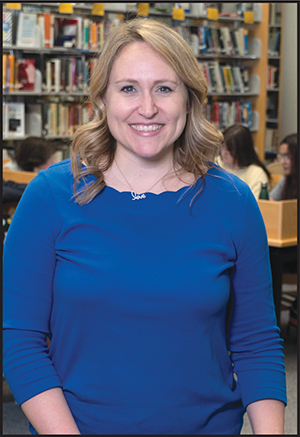Jamie Gregory l Movers & Shakers 2022—Educators
With disinformation more prevalent than ever, teaching students how to analyze and understand what’s coming at them has never been more important.
 |
CURRENT POSITIONUpper School Librarian and Journalism/Newspaper teacher, Christ Church Episcopal School, Greenville, SC DEGREEMLIS, University of South Carolina, 2012 FOLLOWPhoto by Owen Riley |
Media Mentor
With disinformation more prevalent than ever, teaching students how to analyze and understand what’s coming at them has never been more important.
Jamie Gregory is determined that a lack of media awareness and ability to think critically won’t happen on her watch. Among the many initiatives she’s led at the private Christ Church Episcopal School is the creation of a Google Hyperdoc for a module called Reframing for Truth in Information. In it, students study and evaluate policies for various social media sites and discuss whether or not social media platforms should censor speech.
Another project involved bringing in someone from the News Literacy Project who led students through the fact-checking process. Gregory also had students analyze various examples of media related to the COVID vaccine, such as infographics, videos, and images, looking at the strategies used to influence messages and rooting out potential bias.
A collaboration with a senior English teacher led to a Voices of Protest unit on book censorship. Students read the Library Bill of Rights, court cases on book censorship, and studied recent book burnings. One class staged a mock school board meeting where they stood up for the freedom to read using research, defending books Gregory bought for the school with a Freedom to Read Foundation grant.
Says Gregory, “You’re having them grapple with a real-world issue, but starting [by] slowly scaffolding so they can actually think about other points of view, other than what just pops in their head at first. That exposes them to different points of view and different types of information.”
Some of the books they read had been censored and removed from curricula in South Carolina public schools, so it had great relevance to the students. They wrote editorials about the books, showing the knowledge they’d gained and sharing educated opinions about censorship and freedom of speech.
That local relevance extends to the study of history as well as current events. A teacher’s unit on the Progressive Era and labor unions led Gregory to develop units about labor unions, using song lyrics, documentary clips, political cartoons, infographics, and photos. While researching, she discovered a memoir by a local author whose grandfather was involved in a shooting as a mill superintendent. The author provided students with a free link to the ebook and paid a virtual visit after the students read it.
By connecting what students already know to what they need to know, Gregory brings critical thinking skills home.
RELATED
ALREADY A SUBSCRIBER? LOG IN
We are currently offering this content for free. Sign up now to activate your personal profile, where you can save articles for future viewing










Add Comment :-
Comment Policy:
Comment should not be empty !!!